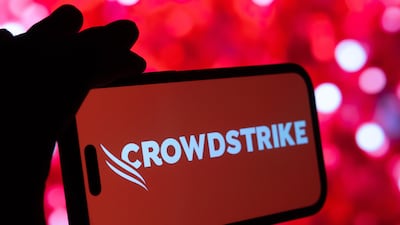The first inklings that something had gone badly wrong started to emerge around 9.30am GST.
Computers in Asia were showing the infamous "blue screen of death", known in the IT world as BSOD. Companies from airlines to supermarkets to television broadcasters and beyond were being shut out of their networks due to a global IT outage.
The source of the problem and the cause of chaos that ensued - hitting flights, banks, shops and TV - seemed to be an issue with an update that was being rolled out by CrowdStrike, one of the world's largest cybersecurity companies.
"CrowdStrike is aware of reports of crashes on Windows hosts related to the Falcon Sensor," the company said in an alert, as it started to roll back its faulty update.
What does CrowdStrike do?
As a company, CrowdStrike helps companies manage their security online, by protecting them against hackers, stopping data breaches and ransomware attacks.
As such, its customers number in the thousands across the global and include some of the world's largest companies.
CrowdStrike's chief executive, George Kurtz, a former staff member at the software security maker McAfee, founded the company 12 years ago.
What is Falcon Sensor?
The company's main product is CrowdStrike Falcon, which it describes on its website as "providing real-time indicators of attack, hyper-accurate detection and automated protection".
It's believed that an update to its Falcon Sensor software is the cause of the IT outage as it effectively caused a fault with computers running Windows software, as users experienced the BSOD and were such out of their systems.
What was the impact?
Because the Falcon update was coming through Windows, the speed and scale of the impact was enormous. By Microsoft's own calculations there are about 1.4 billion Windows PCs worldwide, which are in use in different industries.
This means that the faulty update caused retailers' payment systems to crash, and airline computer systems to fail, which led to thousands of planes being grounded and global broadcasters to fall off air. In addition, train companies and airports were thrown into chaos and medical services were disrupted, while banks and stock exchanges had issues.
Essentially, every transaction, payment or booking made online using Windows software that received the Falcon update was potentially vulnerable.
Many people had to resort to paying cash, as retailers were unable to accept cards on Friday morning.
Share price plunges
CrowdStrike's share price plunged 15 per cent in pre-market trading in the US on the back of the global IT outage.
Essential CrowdStrike's shares are owned by institutional investors, who own 40 per cent of the stock and public companies and individual retail investors who own 57 per cent of the company.
The US investment fund, Vanguard Group is the largest single investor with a slice of the company that amounts to just less than 7 per cent.
What has CrowdStrike said?
Mr Kurtz said that the company was "actively working with customers impacted by a defect found in a single content update for Windows hosts.
"Mac and Linux hosts are not impacted. This is not a security incident or cyberattack. The issue has been identified, isolated and a fix has been deployed."
As the world awaits for the fix to roll out, Kevin Reed, chief information security officer of Swiss-based cybersecurity firm Acronis, said the update "necessitates manual intervention to resolve, specifically rebooting systems in 'safe mode' and deleting the faulty driver file.
"This process is cumbersome and leaves systems vulnerable in the interim, potentially inviting opportunistic attacks."
Meanwhile, cyber security expert Dan Card, from BCS, The Chartered Institute for IT, said that "companies should make sure their IT teams are well supported as it could be a difficult and highly stressful weekend for them as they help customers".
"People often forget the people that are running around fixing things," he added.





























